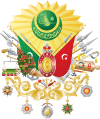Cemile Sultan
| Cemile Sultan | |||||
|---|---|---|---|---|---|
| Born | 18 August 1843 Beylerbeyi Palace, Istanbul, the Ottoman Empire | ||||
| Died | 7 February 1915 Erenköy, Istanbul, the Ottoman Empire | ||||
| Burial | Mausoleum of Sultan Abdülmecid I | ||||
| Spouse | Mahmud Celaleddin Pasha | ||||
| Issue | Fethiye Hanım Sultan, Fatma Hanım Sultan, Ayşe Hanım Sultan, Sultanzade Mehmed Mahmud Celaleddin Bey, Sultanzade İbrahim Sakıb Bey. | ||||
| |||||
| House | House of Osman | ||||
| Father | Abdülmecid I | ||||
| Mother | Düzdidil Hanımefendi | ||||
| Religion | Islam | ||||

Cemile Sultan (18 August 1843 – 7 February 1915) was an Ottoman princess, daughter of Sultan Abdülmecid I and his wife Düzdidil Hanımefendi, the daughter of Şıhım Bey Dişan. She was the half sister of Sultans Mehmed VI, Murad V, Abdul Hamid II and Mehmed V of the Ottoman Empire.
Biography
Cemile Sultan was born as the daughter of Sultan Abdülmecid I and his wife Düzdidil Hanımefendi. Somewhat earlier, in 1845, Princess Cemile's mother, the lady Düzdidil, died leaving Princess Cemile motherless at the age of two. Abdülmecid took Princess Cemile to Rahime Perestu Sultan, who was the adoptive daughter Abdülmecid's aunt Esma Sultan, and entrusted her into the lady's care, telling her, "Now see, I have also brought you a daughter. She grew up together with her half brother Abdul Hamid II, who was also adopted by Rahime Perestu, in the same household and spend their childhoods with one another. On ceremonial occasions Princess Cemile took precedence as she was the eldest, and always took her place at Abdul Hamid's right. A large armchair was reserved for her on the right-hand side, where she took a seat. In processions she walked at the side of the Queen mother, Rahime Perestu, ahead of everyone else."
She always wore brown-colored dresses and on her head a hotoz of the same color, fashioned of lace or tulle. She dressed in the Turkish style, with a long train fastened to her waist. Since the sumptuous fabrics she wore were always various shades of brown, this color served as something of a hallmark for her. She wore no jewels whatsoever. Despite this simplicity, her imperial bearing amply conveyed her rank of princess. Those in a position to know said that she looked just like her father, Sultan Abdülmecid, and indeed from the photographs the eyes and the features are the same. Everyone in the palace felt great respect and fondness for Princess Cemile, holding her in affectionate system. She spoke so graciously and intelligently, not laughing when it was not called for, and exhibiting toward everyone the appropriate conduct due him or her.
On 1 June 1858 she was married to Mahmud Celaleddin Pasha as his third wife, the son of the Imperial son-in-law, Damat Ahmed Fethi Pasha and his wife Ayşe Şemsinur Hanım. Together with Mahmud Celadeddin Pasha they had three daughters, Princesses Fethiye Hanım Sultan, Fatma Hanım Sultan and Ayşe Hanım Sultan and two sons Sultanzade İbrahim Sakıb Bey and Sultanzade Mehmed Mahmud Celaleddin Bey. The couple supported Abdul Hamid's accession to the throne, until the new Sultan's mistrust of Mahmud Celaleddin Pasha led to the latter's exile to Arabia in 1881, where he was strangled in 1884. Princess Cemile withdrew from society for some twenty years, afterwards reconciling with her brother and paying calls again at the palace She died at Erenköy, Istanbul on 26 February 1915 and was buried in the mausoleum of her father, Sultan Abdülmecid.
References
- "Turkey: The Imperial House of Osman". web.archive.org. Retrieved 6 February 2014.
- The Concubine, the Princess, and the Teacher: Voices from the Ottoman Harem. University of Texas Press. 2010. ISBN 978-0-292-78335-5.
- Fanny Davis (1986). The Ottoman Lady: A Social History from 1718 to 1918. Greenwood Publishing Group. ISBN 978-0-313-24811-5.
- Ayşe Osmanoğlu (2007). Babam Sultan Abdülhamid: hatıralarım. Selis Kitaplar.

